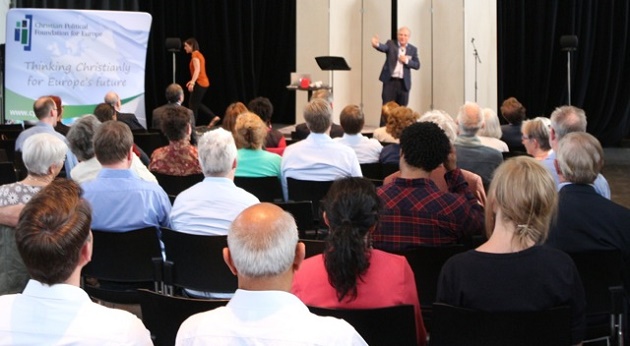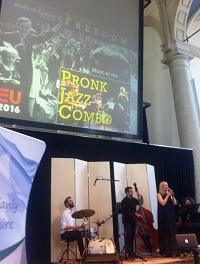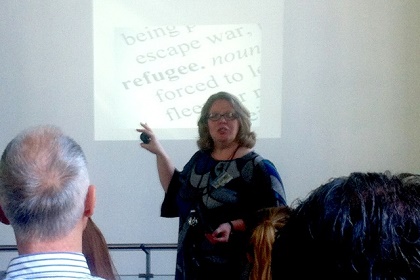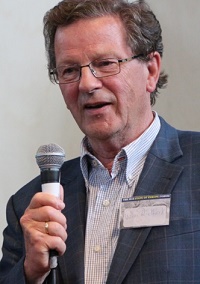State of Europe Forum: “Seek the common good”
“Christians should be prepared to argue for positions which advance the international common good even at the apparent expense of their national interests”, Dr Jonathan Chaplin said in Amsterdam (May 8-9).
AMSTERDAM · 16 MAY 2016 · 15:39 CET

Christians in Europe must rise above narrow horizons of national interest, seek the international common good and urge fellow citizens to do likewise, argued Dr Jonathan Chaplin at the State of Europe Forum in Amsterdam last weekend (May 8-9).
‘We reject the secularist liberal assumption of the primacy of individual self-interest in national politics, and the equivalent assumption in international politics’, he declared, blaming this attitude for blocking a just resolution of the EU response to the refugee crisis.
‘Christians should be prepared to argue for positions which advance the international common good even at the apparent expense of their national interests, as did the statesmen who launched the project of European integration with such courage and foresight,’ he continued.
Speaking in the opening plenary on the eve of Europe Day, May 9, in the 400-year-old Zuiderkerk, the director of the Kirby Laing Institute for Christian Ethics in Cambridge posed the question, what is the EU for?
Europe Day commemorates the Schuman Declaration made on that date in 1950, which launched the European Coal and Steel Community and began the process of European unification.
The State of Europe Forum is held each year around this date in the capital of the country holding the presidency of the EU, initiated by the Schuman Centre for European Studies and the Christian Political Foundation for Europe. Some 100 participants from 20 European nations gathered for this year’s event in the old city centre.
SHOCKS
Robert Schuman understood very well that the project of European integration was political before it was economic, Chaplin explained. If the political ends of the project ever came to be dominated by the economic means, it would fail. Schuman said that European integration “cannot and must not remain an economic and technical enterprise; it needs a soul, the conscience of its historical affinities and of its responsibilities in the present and in the future, and a political will at the service of the same human ideal.”
Chaplin cited the series of tumultuous shocks threatening the project today, including the rise of nationalistic and xenophobic movements across many EU states, the global financial crisis, the Eurozone crisis and the prospect of a Grexit, jihadist terrorism, technological threats to human personhood, environmental degradation, the resurgence of Russian nationalism, the catastrophic refugee crisis, the genuine possibility of a Brexit and the serious risk of a subsequent unravelling of the EU that could follow.
The crises facing Europe and the world demanded such a political institution as the EU ‘with a necessary, honourable and demanding moral vocation: to promote conditions of justice, peace, solidarity and freedom across European public space’.
To this end Christians should engage as European citizens, with the risky, faltering, dysfunctional but necessary and visionary project that was the European Union, concluded Chaplin.
CELEBRATION

A narrated screenshow focussed on the liberation of the city from Nazi tyranny, when the Zuiderkerk had to be used as a moratorium for the bodies of those who died during the hunger-winter of 1944-45. Those post-war years, however, were dominated by fear and anxiety as Europe faced a new war, bitterness, brokenness and serious post-trauma stress disorder.
On 9 May 1950, Robert Schuman, the French foreign minister, made his surprise declaration which today is recognised as the birth of the EU. He and his German and Italian counterparts, Adenauer and de Gasperi, were devout believers and envisioned Europe as a ‘community of peoples deeply rooted in basic Christian values’.
Thus began the 70-year period some call ‘the long peace’. Threats to this peace and freedom today formed the focus of the ten track sessions held last Monday.

Speakers and contributors to these sessions, covering roughly the list cited by Chaplin above, included Monsignor Ad Van Luyn (former bishop of Rotterdam), Rev Arjan Plaisier, general secretary of the Protestant Churches in the Netherlands, Professor Prabhu Guptara (CH), Dr Stefan Waanders (NL), Dr Richard Tunbull (UK), Julian Lindley-French (UK/NL), defence expert and consultant to NATO, Jarno Volmer, anti-terrorist officer at Schiphol airport, Jennifer Roemhildt Tunehag (SE) of the European Freedom Network, Julia Doxat-Purser (UK) and Christel Ngnambi (BE), both of the European Evangelical Alliance, Tim Pluschinski (DE) of the World Evangelical Alliance, Lorcan Price (IE) and Richard Kane (UK) among numerous others.

The closing word was brought by Wim Rietkerk, chairman of L’Abri International, reflecting on major changes over the past 25 years since the collapse of the Soviet Union. No-one knew what was to come then, he said: 9/11, Osama Bin Laden, the so-called Arab spring, the bloody wars in Libya, Egypt, Syria, Irak, the rise of ISIS (Daesh), and the resulting immigration of millions of (mainly) Moslem refugees.
These developments faced us with the question: would the European House stand? Or would it crack under outside pressure? The answer was: Yes, unless we held on! We had to learn the art of holding on.
Jesus told the church in Philadelphia: Hold on to what you have (Rev. 3:11). That little command to the church of the New Testament contained a programme for Christians in Europe today. All the elements of what we should do in the complexity of our situation were hidden in this final call.
Papers and photos of the forum will be uploaded shortly the official State of Europe Forum website.
Published in: Evangelical Focus - cities - State of Europe Forum: “Seek the common good”
